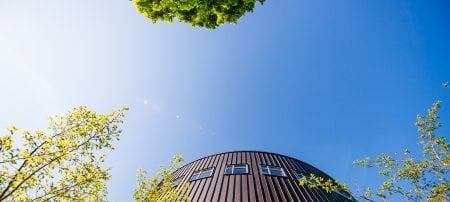International Climate Change Conference: Another Dispatch from Copenhagen

Catherine (Cate) Cogger is an undergraduate in anthropology at Michigan Tech. She spent the fall semester as an exchange student at the Norwegian University of Science and Technology in Trondheim, Norway. Since Copenhagen, Denmark, is only a short train and plane ride from Trondheim, she decided to travel there to be part of the international climate change conference, or in her words, “to witness what will surely be world history.”
Here is Cate’s report.
I am in Copenhagen at the moment, or KØbenhavn as the locals call it. My major is anthropology, but my focus is environmental anthropology. Having an interest in climate change as well as the environmental, social, and political issues arising from this phenomenon inspired me to travel to Copenhagen to witness what will surely be world history.
Perhaps one of the most outspoken and well-known organizations here is GreenPeace. Having gained a reputation for frequent and passionate demonstrations in the past against a variety of environmental threats, disasters and injustices, demonstrators from the organization are here in Copenhagen in force. On Saturday, thousands of GreenPeace members and empathetic global citizens marched throughout Copenhagen with placards and banners proclaiming a variety of messages like: "Act Now," "There Is No Planet B" and "Nature Doesn't Compromise." Their main message today during their march was that the selling and trading of carbon credits is unethical and not a solution to reducing rising CO2 levels within the atmosphere.
Following the GreenPeace march were a variety of other marches from global environmental organizations such as Friends of the Earth, whose messages were in the same vein as GreenPeace. Once again, police and security personnel were out in abundance, patrolling the streets, waterways and even the skies. Helicopters could be seen hovering for hours above the demonstrations and at a variety of spots all throughout the city.
The second event we attended over the weekend centered on circumpolar research and exploration efforts. Much of the research surrounding the climate change talks has to do with data obtained in polar regions. Ice core data, melting ice shelves and rapidly diminishing permafrost are some of the most alarming indicators of the rapid climatic changes the earth is now experiencing.
In a tent devoted wholly to lectures pertaining to Arctic regions, we listened to two men tell their stories of interaction, exploration and observation of rapid climate change in polar areas. The first described his sailing journey through the Northwest Passage, a feat accomplished by very few people. His talk focused largely around the complicated social issues linked to climate change, and how many of the northern indigenous populations bordering or living in Arctic regions have been the first victims of unpredictable and dangerous climatic shifts. His report was from a journalistic perspective, but was nonetheless eye-opening.
The second lecturer was the well known polar adventurer, Will Steger, who visited Michigan Tech just last year. He has more than 30 years experience traveling in both the North Pole and Antarctica. Steger has, perhaps, one of the best and most detailed firsthand accounts of what is happening to our poles. The North and South Poles hold the majority of the freshwater supply on Earth, locked up in glaciers and ice shelves. The stability of the ecosystems in these areas is now diminishing at a rate more rapid than ever before seen, threatening many low lying communities and cities around the world.
This is the second dispatch from the international climate change conference in Copenhagen. Read the first one, by forestry graduate student Adam Airoldi.
Michigan Technological University is an R1 public research university founded in 1885 in Houghton, and is home to nearly 7,500 students from more than 60 countries around the world. Consistently ranked among the best universities in the country for return on investment, Michigan's flagship technological university offers more than 120 undergraduate and graduate degree programs in science and technology, engineering, computing, forestry, business, health professions, humanities, mathematics, social sciences, and the arts. The rural campus is situated just miles from Lake Superior in Michigan's Upper Peninsula, offering year-round opportunities for outdoor adventure.




Comments